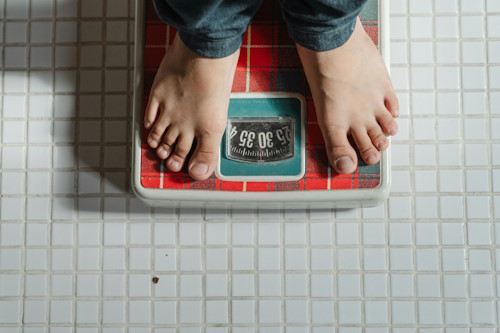Nearly 30 million Americans experience eating disorders. A woman opens up about more than two decades of misunderstood behaviors.
According to data shared by the National Eating Disorders Association, 9% of the U.S. population—about 28.8 million Americans—will experience an eating disorder in their lifetime. While these disorders affect people of all ages and backgrounds, certain risk factors such as genetics, anxiety, depression, and a history of dieting can increase vulnerability. Common eating disorder symptoms include restrictive eating, compulsive exercising, binge-eating, or self-induced vomiting. Left untreated, eating disorders can lead to severe medical complications, including heart disease, digestive issues, and even organ failure.
BREAKING: This Keeps Your Blood Sugar Below 100 - Even When You're Eating Sweets!
An eating disorder is a complex mental health condition that profoundly affects a person’s relationship with food, body image, and self-worth—often even their relationships with others. An eating disorder can lead to behaviors such as extreme dieting, binge-eating, or purging, often developing quietly and going unnoticed, even by the individual who’s experiencing them. Despite their seriousness, eating disorders are frequently misunderstood, leaving many to suffer in silence without a diagnosis or proper support.
“One of the most common misconceptions about disordered eating is that it’s a ‘young white woman’s disease,'” says Leslie Heinberg, PhD, vice chair for psychology in the Center for Behavioral Health at the Cleveland Clinic. “The truth is that disordered eating can affect any sex, race, or age. In fact, men account for 25% of disordered eating cases,” she adds in the Clinic’s Health Essentials blog.
What are the different types of eating disorders?
Eating disorders manifest in different ways, with the most common including:
- Anorexia nervosa: Characterized by extreme food restriction, an intense fear of weight gain, and a distorted body image. People with anorexia often see themselves as overweight even when they are dangerously underweight.
- Bulimia nervosa: Marked by cycles of binge-eating followed by compensatory behaviors such as self-induced vomiting, laxative misuse, or excessive exercise. Individuals with bulimia may maintain a normal weight but suffer severe physical and emotional consequences.
- Binge-eating disorder (BED): The most common eating disorder, BED involves recurrent episodes of consuming large quantities of food, often in secret, accompanied by feelings of loss of control and extreme guilt. Unlike bulimia, there is no purging behavior.
- Avoidant/restrictive food intake disorder (ARFID): A condition in which individuals severely limit the amount or types of food they eat due to sensory issues, fear of choking, or a lack of interest in food. This can lead to significant nutritional deficiencies and health problems.
Because eating disorders vary widely in presentation, many people fail to recognize their symptoms as part of a larger issue. Recognizing the signs early can make a significant difference in recovery. “Early intervention is associated with the best outcomes,” says Dr. Heinberg. “Once disordered eating becomes entrenched in a person’s daily life, it’s much harder to address. In fact, the patient may deny that it’s causing problems at all.”
For Jennifer James, a 41-year-old woman from Tampa, Florida, it took years to realize that her relationship with food wasn’t normal. Ahead, she shares how she lived with an undiagnosed eating disorder for most of her adult life and what finally led her to seek help.
Here’s How I Knew I Had an Eating Disorder
By Jennifer James, as told to Dr. Patricia Varacallo, DO
I’m 41 years old, and for over two decades, I had no idea I was living with an eating disorder. Looking back, I see that I didn’t recognize the symptoms because my case didn’t fit my perception of what an eating disorder “should” look like.
Eating disorder symptoms
I can remember being preoccupied with food and weight as early as high school. I was never underweight. In fact, I was at a healthy weight or a bit above average, so I never thought I could have an eating disorder. In my teens and twenties, I often went on yo-yo diets. I would severely restrict what I ate for a week or two, crash off the diet and end up binge-eating, then feel awful and resolve to “be good” by dieting again. I just thought I had “bad willpower” and a normal desire to lose a few pounds.
What I didn’t realize was that these behaviors were classic symptoms of binge-eating disorder. I’d eat until I was uncomfortably full, and afterwards I’d be flooded with guilt and shame. But because I wasn’t making myself vomit and I wasn’t stick-thin, I dismissed the idea that it was an eating disorder. I told myself I just needed more discipline or a better diet.
From subtle signs to serious struggles
In my mid-twenties, my career became more stressful and my binges got worse.
I started hiding my eating. For example, at dinner with friends or family, I’d eat a small portion and pretend I was fine, but later that night, I’d raid the kitchen and eat a huge amount alone. Also, if I had a “bad” eating episode, I’d compensate by skipping meals the entire next day. My weight fluctuated often—down five pounds, up 15. I felt miserable and out of control, but I still didn’t know these were symptoms of an eating disorder.
Besides the eating itself, there were emotional signs that something was wrong. My anxiety around food was through the roof. I constantly thought about what I had eaten or what I would eat next. If we were going to a restaurant, I’d scour the menu beforehand for the lowest-calorie options and rehearse in my head what I’d allow myself to order. At the same time, I dreaded being “seen” eating too much. On the outside, I acted like everything was fine, but internally I felt trapped in a cycle of obsession and self-loathing.
My turning point: Seeking help
It wasn’t until age 36 that a doctor’s visit finally opened my eyes. I went to see my primary care provider (PCP) for an unrelated health issue—I was having frequent heartburn and stomach pain. After some gentle questions, my doctor learned about my eating habits. I mentioned my frequent dieting and occasional overeating.
I’ll never forget the moment she paused and looked at me with kindness. She she believed I had an eating disorder.
My doctor explained that the pattern of binging and restricting I described sounded like binge-eating disorder, and the stomach problems could be related (from overeating large volumes and then not eating, confusing my digestive system). She referred me to a psychiatrist and a nutritionist who specialize in eating disorders.
I have to admit that I felt guilty after getting that referral, like I wasn’t “sick enough” to deserve help since I wasn’t underweight. (Later I learned this is a common misconception and everybody of any size can struggle with disordered eating and deserves help.) It took me a couple of months, and another bad cycle of binging, before I actually made the appointment with the specialist.
In the end, what pushed me to go was the realization that my behaviors were only escalating. I worried about my health: My blood pressure was up, and I felt physically awful after binges. I desperately wanted to break free of the cycle.
Being diagnosed with binge-eating disorder
The psychiatrist and dietitian team officially diagnosed me with Binge-Eating Disorder (BED). Receiving the diagnosis was emotionally challenging. I had to confront the fact that I’d been struggling with this disorder for years without acknowledging it. I mourned for my younger self, all that time I suffered in silence, thinking I was just “broken” when I could have gotten help.
Another challenge was opening up to others. I had to tell my family and two of my closest friends about the diagnosis so they could support me. My mom and I had a heartfelt conversation and she apologized for not recognizing my struggles earlier, but I don’t blame her at all—I’d hidden it well, and most people simply aren’t taught to spot these issues unless the person becomes very underweight.
Treatment and recovery with an eating disorder
I began seeing my psychiatrist for weekly talk therapy, specifically a form of cognitive-behavioral therapy (CBT) adapted for binge-eating disorder. In our sessions, we worked on identifying the emotional triggers for my binges (for me, stress and feelings of failure were big triggers). We developed healthier coping strategies for those moments, for example, when I felt the urge to binge, I learned to pause and practice a grounding technique or call a friend instead. We also worked a lot on my body image and self-esteem, challenging the negative thoughts I had about myself.
On the nutrition side, I met with the registered dietitian who helped me relearn how to eat regular, balanced meals. This was surprisingly hard at first. I was so used to the restrict-binge cycle that eating normally felt very unnatural.
We set up a structured meal plan: Three meals a day and two snacks, focusing on incorporating all food groups in moderate portions. In the beginning, I actually had to schedule my meals and even set alarms to remind me to eat, because my instinct was still to skip eating after a binge day.
Over time, consistent eating helped reduce my binge urges because I was no longer constantly ravenous or thinking about food 24/7. No foods were off-limits in my plan. My dietitian specifically said I had to stop labeling foods as “good” or “bad.” This was difficult mentally, but it gradually removed the power certain foods had over me.
In addition to therapy and nutrition counseling, I joined a support group my psychiatrist suggested for those with binge-eating disorder. For the first time, I didn’t feel alone or abnormal, there were other people who got it. We shared strategies and victories and setbacks, and it really reinforced that recovery is possible.
My psychiatrist and primary doctor also discussed the option of medication. In my case, I started an SSRI antidepressant, which helped with my underlying anxiety and depression, and there is some evidence that SSRIs can reduce binge frequency for some patients.
After a few months, we also tried a medication called lisdexamfetamine (Vyvanse), which is actually FDA-approved to treat moderate-to-severe binge-eating disorder. I was a bit hesitant, but it did help curb my binge impulses. (This is not used for everyone, but it was part of my plan given the severity of my binge episodes.)
Throughout this process, my doctors monitored my health. At one point, I had a slight electrolyte imbalance from a particularly bad period of bingeing and restricting, and we corrected that with supplements and more structured eating.
How I’m doing today
It’s been five years since I started treatment. I won’t pretend that it’s all perfect now. Recovery has been a gradual journey, with ups and downs. However, I can confidently say I’m in a much better place. My binge episodes have reduced dramatically. I maybe have had one small binge in the last six months, compared to the past frequency of my binges, which was multiple times a week.
When I do slip, I don’t spiral into self-hate like I used to. My weight has stabilized at a place that is healthy for me. More importantly, my mindset around food is totally transformed. Food is starting to become just food—not a punishment or a reward, not a test of willpower or a coping mechanism, but simply fuel and something to enjoy in moderation.
Emotionally, I’m kinder to myself now. I won’t lie: I still have moments when I look in the mirror and don’t love what I see. But I’ve learned to not let those moments dictate my worth or whether I eat that day.
My advice for others
If any part of my story sounds familiar to you, I want you to know you’re not broken or weak. Eating disorders come in many forms. I went years thinking, I just lack discipline, when in reality I had a mental health condition that needed treatment, just like diabetes or asthma needs treatment.
My biggest piece of advice is don’t wait. If you even suspect you might have an issue with disordered eating, reach out to a medical professional. The sooner you seek help, the sooner you can begin your journey to recovery.
TRENDING: Shed 42 lbs In 30 Days With This Simple Night-time Pill
What to do if you suspect you have an eating disorder
If you think you may have an eating disorder, seeking help early is essential. Here’s what to do:
1. Start with your PCP: They can assess your health, check for complications, and refer you to specialists. Be honest about your symptoms.
2. Consider seeing a specialist directly: A psychologist, psychiatrist, or registered dietitian specializing in eating disorders can provide targeted treatment. Some eating disorder clinics offer multidisciplinary care with a full support team.
3. Seek immediate medical attention if you experience:
- Fainting, dizziness, or difficulty staying conscious
- Irregular heartbeat, chest pain, or shortness of breath
- Severe abdominal pain or vomiting blood
- Extreme weakness, confusion, or disorientation
- Suicidal thoughts or self-harm (call 988 for the Suicide & Crisis Lifeline)









